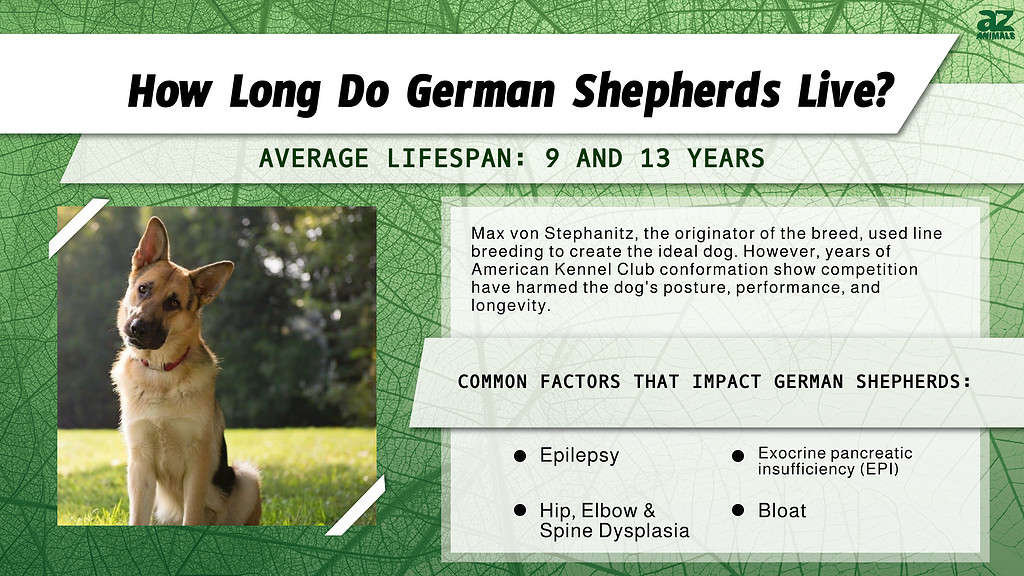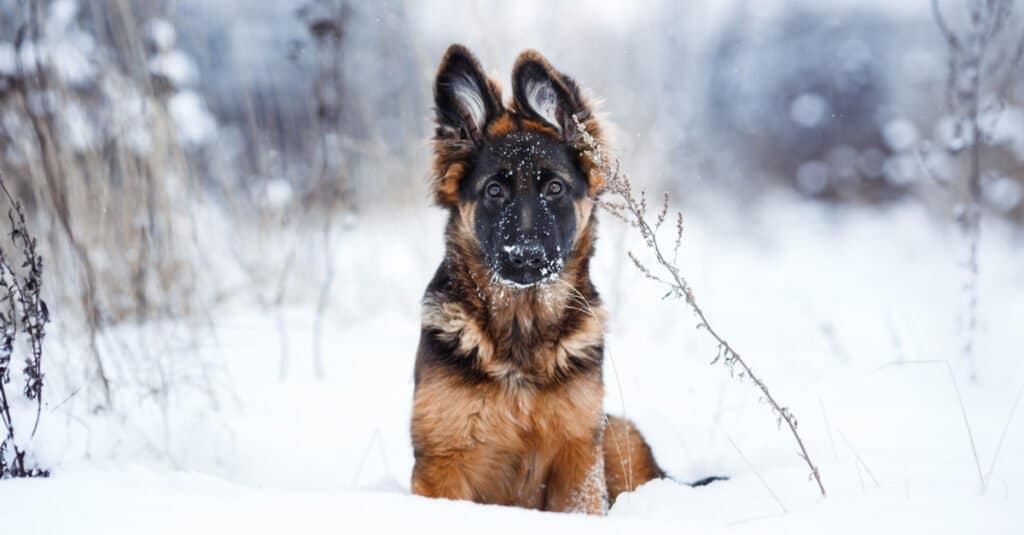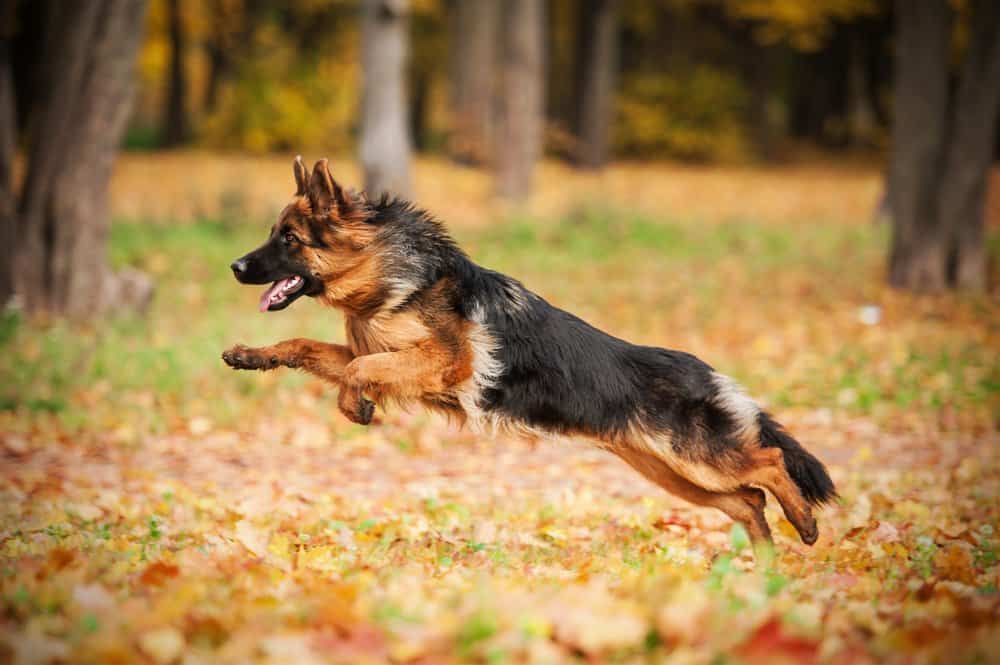
The German Shepherd Dog (GSD) has been the second most popular dog in the US for ten years and has been in the top ten for decades. It’s no wonder either. They are a breed noted for their courage, intellect, and loyalty. When you buy or adopt a German Shepherd, one of your main concerns is how long it will live. Knowing the breed’s average lifespan and how to keep your dog healthy in old age can be useful information for owners.
So, how long do German Shepherds live, and are there ways to extend your German Shepherd’s life? Keep reading and find out!
How Long Do German Shepherds Live?

The average life expectancy for the
German Shepherd dog
is between 9 and 13 years.
©dezy/Shutterstock.com
The average life expectancy for the German Shepherd dog is between 9 and 13 years.
Female German Shepherds live an additional 1.4 years on average than males. In general, female German Shepherds live to a median of 11.1 years, however, males have a median lifespan of 9.7 years.
Like all dogs, some German Shepherds can live past their average lifespan. There are reports of German Shepherds living into their late teens (perhaps 18 to 20 years old), but they’re largely unverified. A German Shepherd mixed breed reached 15 years of age in Scotland in 2017. Perhaps reaching an even older age was a German Shepherd left at a shelter in Gardena, California in 2014 that was estimated to be 17 years old.
Factors Affecting German Shepherd Lifespan

Diet, exercise, breeding, and training all impact your German Shepherd’s longevity.
©iStock.com/Barb
The German Shepherd dog’s longevity can be affected by a variety of factors. It’s possible to avoid many of these issues.
Diet
A balanced meal is vital to your German Shepherd puppy’s health. Large breed puppies should be fed a specially prepared chow that supports joint health. Adult dogs also need their caloric requirements satisfied, without going overboard. Overfeeding can contribute to obesity, which in turn, will impact their general health. Senior dogs will need a modified formulation to enhance their health.
Exercise
Puppies require adequate exercise in addition to nutrients. Experts say a three-month-old GSD can walk for 15 minutes, and a one-year-old GSD can exercise for an hour. They should not run downstairs or play on hard surfaces. Early overuse of your dog’s joints might cause hip dysplasia, a painful illness that can induce limping.
After two years of age, your dog should be vigorously exercised for an hour or two. This will keep them in top shape. Insufficient stimulation causes behavioral and health issues in dogs.
Breeding
The longevity of a GSD is heavily influenced by how they are bred. Many breeders choose practical and temperamental dogs above cosmetically pleasing dogs. Most diseases have recessive genes; hence inbreeding is used to retain certain qualities. This can be caused by overbreeding. Instead of breeding to their siblings, line breeding is slightly less dangerous. This increases the longevity of the German Shepherd while keeping desirable features.
Max von Stephanitz, the originator of the breed, used line breeding to create the ideal dog. However, years of American Kennel Club conformation show competition have harmed the dog’s posture, performance, and longevity. Deformity resulted from overbreeding the desirable small back slope. Excessive back sloping might lead to health complications.
Training
Incorrect training or neglect can produce behavioral issues and can also affect your dog’s lifespan. You may be dismayed by an untrained dog, and, like puppies, they gnaw on everything. Ingesting the wrong thing might prove fatal. Trained dogs know how to behave and won’t eat stuff they shouldn’t.
Most people who have an aggressive dog, especially one as large and powerful as a German Shepherd, put them down. So, even when training security dogs, sociability is critical.
What Do German Shepherds Usually Die From?

German Shepherd dogs have a few inherited issues, but overall, the breed is considered healthy.
©iStock.com/VictorRicoFoto
German Shepherd dogs have a few inherited issues, but overall, the breed is considered healthy. The most prevalent issues include epilepsy, dysplasia of the hip, elbow, and spine, and bloat.
They frequently have minor skin, stomach, ear, and eye disorders. Exocrine pancreatic insufficiency (EPI) is also frequent in German Shepherds; one of the main reasons to feed them mild kibble.
During routine exams, your vet should look for heart issues and autoimmune thyroiditis. Regular screening and early detection of health issues will help save your dog’s life. You should also be open to hemangiosarcoma and bone cancer screenings.
How Does German Shepherds Lifespan Compare to Other Breeds?

German Shepherds are recognized for their loyalty, strength, intelligence, and devotion.
©Rita_Kochmarjova/Shutterstock.com
German Shepherds do not have the shortest lifespan, although their size group can be as short-lived as 9 years.
The German Shepherd has a longer lifespan than some. As an example, they can live to be as old as Golden Retrievers but are less prone to cancer.
GSDs are recognized for their loyalty, strength, intelligence, and devotion. To ensure a long and happy relationship with this excellent breed of dog, careful training and care for the early months and years of these puppies’ lives are essential.
Tips to Increase German Shepherd Lifespan
If you are worried about your German Shepherd’s lifespan, here are a few tips to ensure that your pet lives a long and healthy life:
1. Adequate exercise and physical activity
The first thing to keep in mind is that if your dog is overweight or has more pounds than is considered healthy, it may lead to health issues. which is why it is important to keep your dog in great shape. German Shepherds are very energetic and need lots of physical activities. Ensure that you provide them with adequate exercise and both indoor-outdoor activities to keep them lean and active. Take them on regular walks, run, play with them at the park, take them hiking and generally let them run around in the yard.
2. Healthy and balanced diet
A part of keeping your pet healthy is ensuring that you do not overfeed your dog or feed them unnecessary sweet treats. Ensure that they eat a healthy, balanced diet and do not give them too much sugar. Choose low-carb dog food that contains 18 – 22% protein. A healthy adult German Shepherd should be in the weight range of 70 – 90 lbs and to achieve that an active pet should eat no more than 2100 calories a day. If your pet is leading an inactive lifestyle ensure that you do not feed more than 1500 calories a day.
3. Clean teeth equal a healthy body
Keeping their teeth clean is the next step towards being healthy, even more so for canines. It’s a fact that the most common disease develops in their mouth due to bacterial infection, that spreads over time. This kind of infection may spread to their lungs, heart, and kidney, through the bloodstream and reduce the life expectancy by 3 to 5 years. This is why you must ensure that you clean your dog’s teeth every day with dog toothpaste and keep healthy chew toys and bones available for them.
4. Take them for regular vet visits
Just like humans, animals also need to be checked by expert eyes on a regular basis. vets are trained to spot underlying diseases and the behavior of pets closely. They can detect issues that we may never know. Sometimes pets can hide minor pain and discomfort that we may not even be aware of. A vet can spot subtle signs of such issues and help you treat your pet accordingly. Ensure that you keep the vet appointments regular to keep your pet healthy.
5. Neuter and spay your German Shepherd
It is important to ensure that your pet is spayed or neutered at the right age to prevent any additional health risks that come with mating and childbirth.
The photo featured at the top of this post is © iStock.com/jentakespictures
Ready to discover the top 10 cutest dog breeds in the entire world?
How about the fastest dogs, the largest dogs and those that are -- quite frankly -- just the kindest dogs on the planet? Each day, AZ Animals sends out lists just like this to our thousands of email subscribers. And the best part? It's FREE. Join today by entering your email below.
Thank you for reading! Have some feedback for us? Contact the AZ Animals editorial team.






